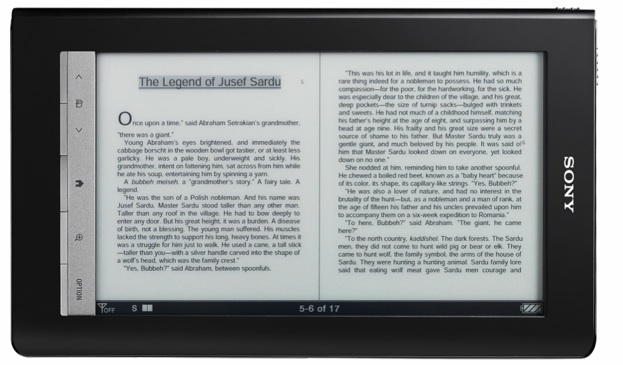
When you are coming from behind, embracing openness is always a good strategy. That is exactly what Sony is doing with its electronic book reader, which is up against the Amazon Kindle. The key to the Kindle’s success is that it is paired with the largest book store in the world, where most people likely to buy an electronic book already have accounts.
Sony is trying to fight this advantage by being more open and thereby attracting other large players into its sphere of influence. Its biggest ally in this fight is Google, whose M.O. is to attack closed industries with open technologies. Today, Google is making available more than one million public domain books in the open ePub format, which also happens to be the linchpin of Sony’s open strategy.
Yesterday, at the unveiling of Sony’s latest electronic book reader at the New York Public Library, the head of its ebook division, Steve Haber, emphasized: “”You want a ubiquitous experience: open, open open.” He repeated the mantra in the way that Steve Ballmer says, “Developers, developers, developers,” except he said it a little softer since he was in a library.
As I’ve mentioned, the key to its open strategy is Sony’s commitment to adopt the ePub format, which is an open format for electronic books. As a result of embracing that format, Sony announced yesterday that libraries, starting with the New York Public Library, would be able to “loan” out digital editions of books in their collection for 21 days to people with Sony Readers. Furthermore, book chains could start selling their own digital books without going through Sony’s digital bookstore as long as the books are in the ePub format.
With an open digital book format like ePub, anyone can sell or distribute electronic books. It doesn’t have to be Sony, which after all is more interested in selling Readers than in selling the books. Amazon’s strategy is the opposite. It wants to sell as many electronic books as possible in case people transition away from paper books. The Amazon Kindle does not support ePub. The Kindle is tied to Amazon’s book store. Its sole purpose is to drive sales of ebooks on Amazon. If you could buy an ebook at Barnes and Noble and read it on the Kindle, that would not make Jeff Bezos happy.
As long as Amazon remains the market leader in electronic books, it can stick to its closed format much like Apple did with the iPod and its DRM-wrapped AAC music format for many years. Eventually, though, open won and Apple removed the DRM from songs in iTunes as well. The same will happen with the Kindle and Amazon, but not until Amazon feels that it has a safe enough lead so that Sony, Google, and all the booksellers in the world combined won’t ever be able to catch up.
Meanwhile, Amazon has joined another open crusade—this one against Google. It is a member of the Openbookalliance, which is a group of publishers, Microsoft, and others who oppose Google’s book settlement. It’s funny how companies choose to be open only when it suits them.